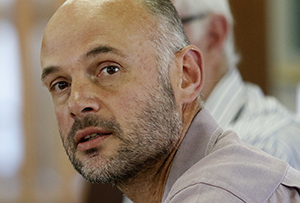Latest News Archive
Please select Category, Year, and then Month to display items
03 October 2018
|
Story UFS
|
Photo Katlego Sekele
 Students engaged authorities and Student Affairs
representatives on sexual and gender-based matters.
Students engaged authorities and Student Affairs
representatives on sexual and gender-based matters.
Do you know enough about the Sexual Harassment, Sexual Misconduct and Sexual Violence policy adopted by the university in June 2018? The Office for Gender and Sexual Equity (GSE) at the University of the Free State (UFS) hosted a dialogue on the role of the institution in matters of sexual and gender-based violence and addressing issues surrounding sexual violations.
Developments such as the countrywide #TotalShutdown: Intersectional Women’s March Against Gender-based Violence last month serve as proof of the dire need for issues surrounding sexual violations to inform policies and active safety measures.
Policy purpose
According to the policy, the objectives are to create a safe and enabling environment, establish a common understanding of what constitutes sexual harassment, sexual misconduct and sexual violence, provide applicable and accurate information, ensure that victims receive the necessary support, clearly outline disciplinary procedures for perpetrators, and clarify institutional accountability.
Student’s take on solutions
Tammy Fray, a member of the Student Representative Council, who formed part of the panel at the discussion, says the policy is not a one-stop-shop solution. “The policy is a guiding document. We have to then use it to inform activist work. We cannot always put the onus on policies and codes of conducts to solve problems. However it is our responsibility within this academic space to come up with solutions that enhance the way the policy works.”
Be informed about the policy
It is important to understand the stipulations of the policy in order to make full use of it. Geraldine Lengau, Officer at the GSE said: “It’s important that students know that the institution is not operating in silos but that their demands have been heard and the institution has acknowledged that there is a need for the policy to be adopted. It also makes the process of reporting better with the assistance of the Sexual Assault Response Team coordinator.”
Lecturer’s debut novel wins ATKV Prize for Fiction
2015-10-14

Dr Francois Smith
Photo: Johan Roux |
Kamphoer made its debut on the literary scene just over a year ago, and on 11 September 2015, it was declared the best novel by the Afrikaanse Taal en Kultuurvereniging (ATKV). This is not the first time Kamphoer has been recognised as literary gem. Earlier this year, the novel was shortlisted for the W A Hofmeyr Prize as well as the Huisgenoot Tempo Award.
Dr Francois Smith, the author, joined the University of the Free State (UFS) as a lecturer in the Department of Afrikaans and Dutch, German and French at the beginning of this year. Prior to entering the academic sphere, he dedicated about 11 years of his life to editing for a publishing house. Certainly, helping other people write and produce books thoroughly prepared him for authorship.
For three months, Smith spent eight hours a day creating his award-winning masterpiece. The secret of success lies in the ABC formula. “The ABC for writing is Apply Back to Chair. You have to go and sit down and start typing,” he says.
That is when passion meets imagination, albeit at times, one might also need inspiration. Smith applied this winning formula meticulously, and it has resulted in over 30 000 copies of Kamphoer being sold since July 2014.
He was taken aback by the novel’s warm reception. “I wrote a book, finished it, and knew that it wasn’t bad but I never for one moment imagined that it would be such a big commercial success,” he said.
About Kamphoer
The book which Smith describes as a good but not an easy read about a disturbing subject is the true story of a woman who was brutally raped during the South African War and left for dead. After the traumatic experience, she dedicates her life to helping others deal with similar ordeals, re-encountering her rapists in the process.
About the award
Kamphoer emerged as an exceptional contribution amongst two other finalists. Kerneels Breytenbach’s Ester as well as Harry Kalmer’s ’n Duisend stories oor Johannesburg were also competing for the prestigious award.